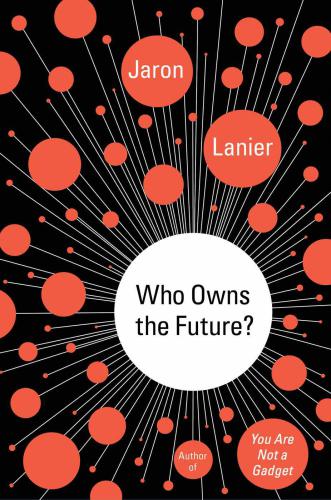
Who Owns the Future?
کتاب های مرتبط
- اطلاعات
- نقد و بررسی
- دیدگاه کاربران
نقد و بررسی

April 8, 2013
Information can’t be free if the digital economy is to thrive, argues this stimulating jeremiad. Noting that the Internet is destroying more jobs than it creates, virtual reality pioneer and cyber-skeptic Lanier (You Are Not a Gadget) foresees a future when automation, robotics, 3-D printers, and computer networks will eliminate every industry from nursing and manufacturing to taxi-driving. The result, he contends, will be a dystopia of mass unemployment, insecurity, and social chaos in which information will be free but no one will be paid except the elite proprietors of the “siren servers”—Google, Facebook, Amazon, and the like—that manipulate our lives. Lanier’s extrapolation of current trends to an economy where almost everyone will be judged redundant is incisive and scary. Unfortunately, his proposal for safe-guarding the middle class—micropayments for the supposedly valuable but currently free information that ordinary people feed into the Web, from consumer profiles and friending links—feels as unconvincing and desperate as the cyber-capitalist nostrums he derides. Lanier’s main argument spawns fascinating digressions into Aristotle’s politics, science-fiction themes, Silicon Valley spirituality, and other byways. Even if his recommended treatment seems inadequate, his diagnosis of our technological maladies is brilliant, troubling, and well worth the price. Agent: Max Brockman, Brockman Inc.

May 1, 2013
A sweeping look at why today's digital economy doesn't benefit the middle class and the ways that should change. If many tech books today offer dire, sky-is-falling warnings, then Lanier (You Are Not a Gadget, 2011, etc.) takes that idea a step further: The sky is falling and will continue to fall until it crushes the entire middle class under its weight. Until recently, new technology has always created new jobs, but in this new information economy, "[o]rdinary people 'share, ' while elite network presences generate unprecedented fortunes"--e.g., when Facebook purchased the photo-sharing service Instagram for nearly $1 billion. Lanier claims this trend is "setting up a situation where better technology in the long term just means more unemployment, or an eventual socialist backlash." Although the author opens with this provocative thesis, what follows is a meandering manifesto bogged down by its own terminology. Lanier includes an appendix listing "First Appearances of Key Terms" (many of which he coined), but readers may wonder why the author couldn't explain this jumble of economic theories and futuristic ideas in more lucid terms: Rather than create the word "antenimbosian," why not just say "before the advent of cloud computing"? This isn't to say that Lanier hasn't come up with some exceptional theories. For instance, he hypothesizes that self-driving cars "could be catastrophic" for the economy. Driverless taxis would rob new immigrants of jobs and deny them a "traditional entry ramp to economic sustenance." However, these concepts are so lost in a heap of digressions, interludes and fables--including the continued recurrence of a fictional seaside conversation between a citizen of the future and a "neuro-interfaced seagull"--that the signal-to-noise ratio may prove to be too much for all but the most dedicated tech readers. An assortment of complex and interesting ideas, buried under the weight of too much jargon.
COPYRIGHT(2013) Kirkus Reviews, ALL RIGHTS RESERVED.

November 1, 2012
Computer scientist, revolutionary thinker, and a leading researcher in the area of virtual reality who either coined or popularized that term (depending on whom you ask), Lanier is the person to listen to about technology. Here he argues that while digital technologies should be guaranteeing our financial health, given the efficiencies they deliver, the information economy has in fact concentrated wealth in the hands of a few--weakening our middle class and hence our democracy. Lanier doesn't just sling arrows but makes suggestions--including monetizing data now treated as being cost free.
Copyright 2012 Library Journal, LLC Used with permission.

May 15, 2013
The author, a computer scientist and digital-media pioneer, describes the negative effects on our economy (such as the recent recession and damaged middle class) by digital networks, defined as not only the Internet and the Web, but also other networks operated by outfits like financial institutions and intelligence agencies where the phenomenon of power and money becomes concentrated around the people who operate the most central computers in a network, undervaluing everyone else. Information is considered free, for example, free Internet services for consumers and data that financial-services firms collect and use without paying for it. The author's solution is a future in which people are paid for information gleaned from them if that information turns out to be valuable. Lanier describes a future in which most productivity will be driven by software and software could be the final industrial revolution. This is a challenging book about a future information economy that the author suggests does not need to be dominated by technology.(Reprinted with permission of Booklist, copyright 2013, American Library Association.)

























دیدگاه کاربران